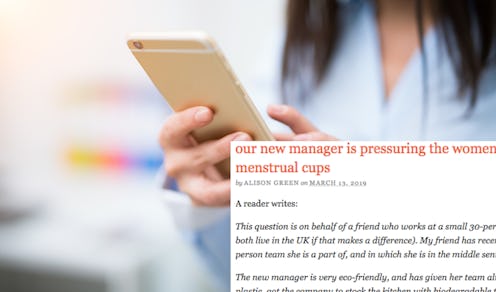Life
A Woman’s Boss Pressured Her To Use Menstrual Cups — Here’s How An Expert Says To Respond

To state the obvious, we spend a lot of our time at work. For those of us whose 40+ hours a week is surrounded by coworkers in an office environment, knowing how to assert workplace boundaries can be tricky. How casual is too casual? What is appropriate workplace banter and what’s oversharing? While some topics of conversation lean more innocuous than inappropriate, there are, of course, some clear lines.
Take, for example, this recent question posed to Ask A Manager, the popular career advice blog, in which a manager pressured employees to use menstrual cups. The question-asker (who asserted they are asking the question for a friend) sought advice after their friend’s manager’s eco-friendly office initiatives started getting more personal. First, it was doling out reusable water bottles, biodegradable tea bags, and the like. All measures the question-asker says her friend appreciated and colleagues also encouraged. However, things took a turn when the manager, a woman, expanded her reusable, “greener” gifts to menstrual products.
“She presented the six female members of the team with menstrual cups,” the question-asker wrote. “This on its own would obviously be horribly invasive — a boss doesn’t have the right to have any input into how you deal with menstruation — but the manager also made several light-hearted comments about how it could now be a pad-free workplace and help the planet.”
The female employees reacted as you might expect: confused, surprised, a little offended. Menstrual cups, while certainly an eco-friendlier option when it comes to menstrual products, are just that: one of a variety of options. There are plenty of ways to be environmentally-conscious during your period from period underwear to sustainably sourced cotton tampons. Menstrual cups are not the be all, end all when it comes to eco-friendly periods.
Additionally, menstrual cups aren’t right for everyone. As the question-asker on Ask A Manager noted, one employee said menstrual cups weren’t an option after complications with her last birth. Using a menstrual cup when you have an IUD, though doable, can be tricky. (Research has shown no increased risk of IUD expulsion when using a menstrual cup. However, menstrual cup manufacturers like DivaCup recommend waiting at least three months after the initial IUD insertion before using a cup.)
After the manager continued insisting on being a pad-free workplace, through joking yet persistant comments, the question-asker’s friend said, “I don’t feel comfortable discussing that kind of thing at work, I’m sure you understand.” However, the comments have continued.
Ask A Manager’s Alison Green said that while the manager could hand out menstrual cups to friends, family, and strangers on the street alike, doing that with the people she manages is a different situation. “And she definitely can’t hassle them about their choice to continue using tampons or pads,” Green added.
Green also noted that if the problem persists, approaching the manager as a group could be the next step. However, the manager’s reluctance to address an individual employee’s complaint reveals a bigger issue. “It’s one thing for her to just be clueless about how this would be perceived,” Green wrote, “but to refuse to back off when people directly ask her to would indicate there’s something more problematic going on here.”
Bustle reached out to Ask A Manager’s Alison Green about knowing when to consult HR if you feel like a higher-up has crossed a professional boundary. “In general, it's smart to default to trying to address an issue directly with your manager first,” Green says. “But if that doesn't get the results you're looking for, or if the manager has created an environment where you don't feel comfortable doing that (for example, if you fear retaliation), you can go to HR for help resolving it.”
Knowing when to talk to HR at work can be challenging, especially when it comes to personal matters. “To be clear, you shouldn't go to HR for minor interpersonal things,” Green says. “You're expected to resolve those on your own.” Differences in work-styles or simply not liking your boss because your personalities don’t mesh isn’t a work issue HR will typically handle, as Green has previously written for U.S. News. Ideally, the manager handing out menstrual cups is one that would have been addressed individually (i.e., when the employee told her manager she wasn’t comfortable with the conversation).
“But you absolutely can seek their help for major boundary violations or anything rooted in treating women and men differently,” Green adds in her email to Bustle. “In the situation with the menstrual cups, any decent HR department is going to want to know about that so they can shut it down, and probably talk more broadly with the manager about boundaries and respecting people’s privacy at work.”
Crossing personal boundaries, especially when those boundaries specific to female employees, goes hand-in-hand with issues of gender-based harassment at work. Green's advice assures employees that they should feel empowered to address those conversations, report comments that are a form of harassment, and ultimately, feel comfortable in the workplace.